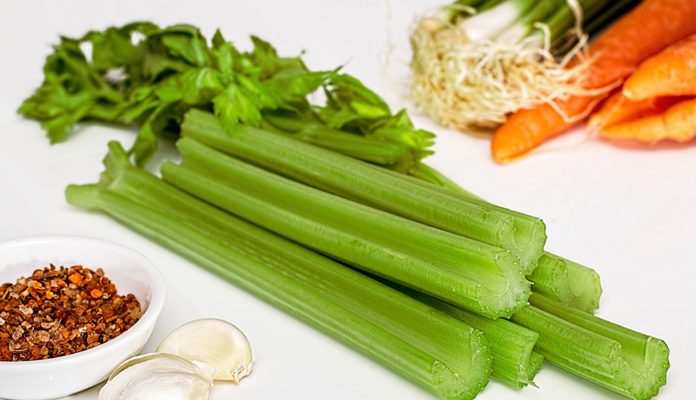Crunchy, low-calorie, and a lovely snack in itself, green celery has more to it than you can think of. A plate of celery can make the most ordinary meals delightful and healthy.
Boiled or blanched ones tend to lose most of their best, while steamed ones retain most of the nutrients and almost 99 per cent of their antioxidants.
This cool-weather crop is produced and consumed on a mass scale by the people of the United States. It is also known as Apium graveolens, which is its scientific name.
It is also produced in places with hot summers and cold winters. Celery contains minerals such as potassium and folate and vitamins such as Vitamin B5, C, and K. Dairy consumption of celery is good for health.
Storing and consuming celery daily
Celery, in its entirety, which includes its leaves, stalks and even seeds, can be used for consumption in various ways.
Fresh celery improves the taste of salads, snacks, and soups as you consume the crunchy vegetable with it. If you are wondering how to keep celery fresh and how to store celery, consider refrigerating it.
In case of daily usage, you can put store-bought celery in the freezer for almost seven days. You can wrap it in paper towels, aluminium foil and also place it in water to keep the celery fresh. Read on the following methods to better store celery in your home.
Proper refrigeration
If you hate going to the store every day, buy your celery and try to refrigerate it. If you have been wondering how long does celery last and how long does raw celery last in the fridge, the answer is that with proper refrigeration, it will stay fresh for at least three to four weeks.
You can wrap it in aluminium foil and place it in the fridge. Write the date on the wrapper so that you know how long it has been there.
Stale celery should never be consumed. The stale ones will seem a bit whitish and hollow in the middle. The stalks will also move away from the stem.
Use aluminium foils
Celery can be stored outside the refrigerator also in aluminium foils. After each usage, you need to wrap it tightly to escape the ethylene content, leaving the vegetable fresh.
Ethylene makes the celery go bad quickly because it actually helps in the ageing of the plant. When wrapped tightly, ethylene is unable to escape and causes the vegetable to decay.
Wet paper towel
Alternatively, you can also store the celery after wrapping it in a wet paper towel. The towel should be wet but not soaking wet. Wrap the same in a plastic bag very tightly so that the ethylene can escape.
Freezing
Another lovely way to store celery is by freezing it. So, for those of you who wondered if can celery is frozen, the answer is yes!
You will have to dice it into small pieces, blanch them in hot water and remove them immediately. Then, chill it is freezing water. Then, drain the excess moisture and freeze them in airtight containers immediately.
If you are still thinking can you freeze celery? Well, you can. Frozen celery will stay good for a long time, unlike refrigerated ones.
Use tightly-sealed container
A word of caution for those refrigerating celery! This leafy vegetable tends to absorb the odours from other food items stored in the fridge. So, it is best to keep it in a separate, tightly sealed container.
Why should you eat it?

Low on calories
Celery is the best friend of vegetarians and helps to put a serious check on weight loss. This is because celery is very low on calories and offers only 16 calories per serving. Dieters swear by the goodness of celery stalk, and you will find someone munching on it at dinner tables.
High on fibre
Just as it is low in calories, it is extremely high in fibre. It moves down the digestive tract fast and ensures that you are safe from colon cancer to an extent.
Rich in minerals and vitamins
Celery is also rich in different types of minerals and vitamins. Vitamin A, folate, manganese, phosphorus, copper, calcium, riboflavin, niacin, Vitamin C and B6 and many more vitamins and minerals.
High in flavonoids
Celery’s flavonoid content is also high. You will find beta carotene, zeaxanthin, and lutein which are very helpful in improving the immune system, reduce heart disease, and grow cancerous cells.
Antioxidants
It also antioxidants that reduce inflammation and arthritis.
Useful for inflammatory conditions
Celery is beneficial for inflammatory conditions, bowel syndrome, urinary infections, and skin disorders.
Get rid of kidney problem
People with kidney problems, cysts, bladder disorders can benefit from the regular consumption of celery because it increases urine production and lowers uric acid content.
Prevent ulcers
Daily consumption of celery leads to the treatment and prevention of ulcers in the digestive tract. This is owing to the presence of ethanol in the vegetable, which completely prevents the formation of ulcers in the first place.
Control blood pressure
Celery is also good for the treatment of high blood pressure. It helps in improving the condition of the heart.
Summary
Celery is among the most consumed vegetables because of its low-calorie content and high nutritional value.
It is used mostly in salads,
It has essential components that fight inflammation, heart diseases and prevent pancreatic and breast cancer.






